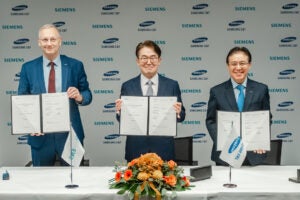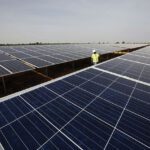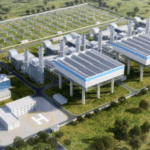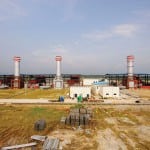Nigerian President Muhammadu Buhari has an ambitious plan to rebuild the country’s power grid, as his government tries to jump-start the slow pace of growth in Africa’s largest economy. Buhari and Siemens CEO Joe Kaeser in July met (Figure 1) in Abuja, Nigeria’s capital, with the result a strategy that Buhari said could almost triple the country’s “reliable” power supply over the next few years.
 |
|
1. Nigerian President Muhammadu Buhari shakes hands with Siemens CEO Joe Kaeser on July 22 after the two announced a deal designed to improve Nigeria’s power sector infrastructure. Source: Presidency of Nigeria |
“My challenge to Siemens, our partner investors in the Distribution Companies, the Transmission Company of Nigeria and the Electricity Regulator, is to work hard to achieve 7,000 megawatts of reliable power supply by 2021 and 11,000 megawatts by 2023,” said Buhari in a statement on July 22, after he announced his government signed a six-year deal with Siemens. Terms of the deal were not immediately disclosed.
Buhari and German Chancellor Angela Merkel in August 2018 had discussed the framework of the deal, which includes a goal of 25 GW of power generation capacity by 2024. “We all know how critical electricity is to the development of any community or indeed any nation,” Buhari said at a news conference after the deal was confirmed. “And whilst we are blessed to have significant natural gas, hydro and solar resources for power generation, we are still on the journey to achieving reliable, affordable and quality electricity supply necessary for economic growth, industrialization and poverty alleviation.”
Kaeser, in an interview with DW Akademie, a German news outlet, said, “[President Buhari] made it very clear in his speech that he wants to get this done now, together with reliable engineering partners—European and German engineering style. And I personally promised to him that we are going to make this work.”
Nigeria’s government-owned grid is operated by the Transmission Company of Nigeria (TCN), which has said the country’s challenges include gas constraints, low load demand by DisCos (the country’s 11 power distribution companies), limited transmission line capacity, a large metering gap, electricity theft, and high technical and commercial losses, among others. The government has acknowledged that only about 4 GW of generation is available on average, though the country has about 13 GW of generation capacity.
Analysts have said the country needs as much as 76 GW of power to serve the entire population. Estimates are that as much as 70% of the country’s population of more than 190 million people do not have access to electricity, and many homes and businesses currently run on diesel- or gas-fueled generators.
Nigeria last year joined with Russia’s State Atomic Energy Corp. (Rosatom) to develop the country’s first nuclear power plant. The country also is looking to boost its supply of natural gas for gas-fired power plants.
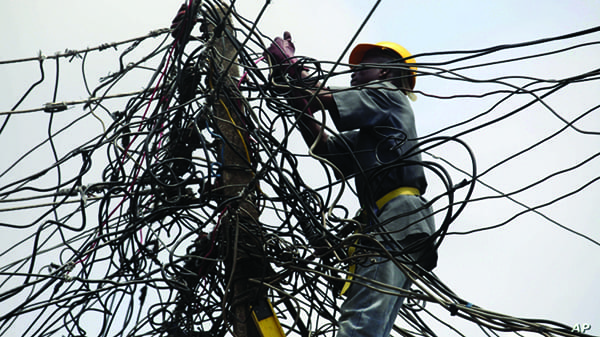 |
|
2. Nigeria’s power grid has been plagued by outages for years, with much of the nation’s transmission and distribution infrastructure in need of repair. A new deal with Siemens is designed to increase the reliability of the electricity supply. Courtesy: Power Holding Company of Nigeria |
Nigeria’s power sector was privatized in November 2013, in hopes of attracting investment to shore up the electricity infrastructure, but problems have persisted. Various reports have said the power grid has sustained more than 100 full or partial collapses in the past six years (Figure 2). The widespread use of generators has created pollution problems in the region; Schneider Electric described the situation as “the alarming reality of mass generator dependency.”
Reuters late last year reported that plans to build a privately financed power station had been delayed because of concerns about continued shortfalls in payments for electricity. The Nigerian Electricity Regulatory Commission (NERC), which oversees the country’s power sector, has said “the financial viability of the electricity supply industry remains the most significant challenge threatening the sustainability of the power sector.”
The deal between Nigeria and Siemens—a “Letter of Agreement on the Nigerian Electricity Roadmap”—was signed by Kaeser and Dr. Alex Okoh, Nigeria’s director-general of the Bureau of Public Enterprise. Buhari at the signing ceremony said work must be done to upgrade the country’s transmission and distribution system, and he said the government has realized it must take the lead after being reluctant to intervene after the power sector was privatized. He called previous government attempts to improve Nigeria’s electricity sector “ill-prepared National Independent Power Projects.” Buhari urged Siemens, along with DisCos, GenCos (the six generating companies), TCN, and NERC to work together the achieve 7 GW of “reliable power supply by 2021” and 11 GW by 2023.
The deal with Siemens includes three phases. In the first phase, stranded power generation of about 2 GW would be moved onto the grid, to push generation to about 7 GW. Phase two includes a grid expansion to enable at least 11 GW of transmission and distribution. The third phase would include new power stations and continued grid expansion to reach the 25-GW goal.
At least two new generating facilities already are being developed. Tas Anvaripour, CEO of Neo Themis, a Moroccan company, recently confirmed that his group has an agreement with Nigeria’s Kingline Development to build a $600 million natural gas-fired power plant in Ondo state. The deal for a 550-MW combined cycle plant includes plans for a new substation, desalination facility, and other infrastructure at an industrial park northeast of Lagos. The power plant is expected to be fully operational in 2022. The state-run Nigerian Bulk Electricity Trading Company has committed to a 20-year take-or-pay contract to buy electricity from the new plant.
Nigerian officials in early August announced an agreement with Greenville LNG, an Abuja-based energy company, to supply liquefied natural gas (LNG) for a 215-MW gas-fired plant in Kaduna state. The new plant is expected to be operational within the next few months. Greenville’s managing director, Ritu Sahajwalla, said the company will transport LNG in trucks, because there are no pipelines to supply the plant, although pipelines are expected to be built in the future.
The contract to build the Kaduna plant was originally awarded in 2009, but officials said the project was slowed due to inadequate financial commitments from the Nigerian government. The plant could bring back the textile industry in the state, where 12 factories—employing more than 35,000 people—operated before the electricity supply to the region ended due to dilapidated transmission infrastructure.
—Darrell Proctor is a POWER associate editor (@DarrellProctor1, @POWERmagazine).





